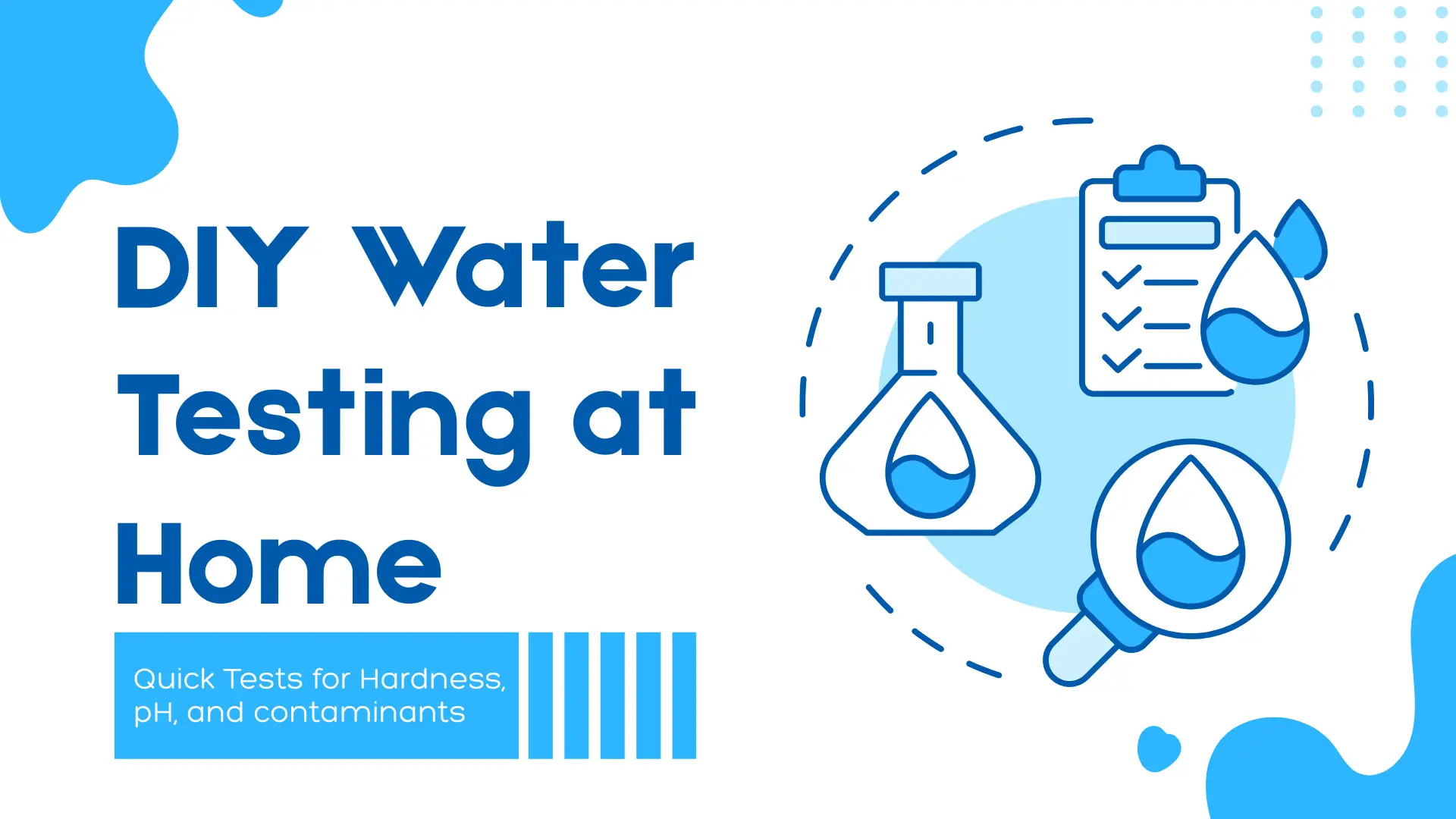When it comes to your family’s health and your home’s longevity, clean and safe water is at the top of the list. For many Texas households, water straight from the tap can contain minerals and contaminants that cause headaches—from limescale build-up in your plumbing to odd-tasting drinking water. Luckily, you don’t always need a lab to get started. With simple DIY water testing at home, you can check for key issues like hardness, pH, and common contaminants.
In this guide, we’ll walk you through why water testing matters, what problems Texas homeowners should look out for, and how to take quick action if your water isn’t where it should be.
Why DIY Water Testing Matters in Texas
Texas water supplies come from diverse sources—rivers, lakes, groundwater, and municipal systems. While water is treated before reaching homes, several factors can affect its quality by the time it flows from your faucet. Some common concerns include:
- Hard water (calcium & magnesium) – Widespread across Texas, causing scale buildup in pipes, reduced appliance efficiency, and skin/hair dryness.
- Chlorine and chloramines – Added by municipalities for disinfection, but they can cause unpleasant taste, odor, and even skin irritation.
- PFAS (forever chemicals) – Emerging contaminants linked to health risks like thyroid problems, liver issues, and increased cancer risk.
- Heavy metals (lead, arsenic, mercury) – Can seep into water from old pipes or soil contamination, posing serious health risks.
- High or low pH – Water that’s too acidic or alkaline can corrode plumbing or leave scaling residues.
Understanding your water helps you make informed choices about filtration, softening, or treatment systems—protecting both your health and your home.
Quick DIY Water Tests You Can Do at Home
You don’t need expensive lab work to get a sense of your water quality. A few affordable DIY kits and methods can give you a quick read.
1. Testing Water Hardness
Hard water is one of Texas homeowners’ biggest complaints. You might already notice:
- White spots on dishes
- Soap that doesn’t lather well
- Scale build-up on faucets and showerheads
How to test:
- Soap Test: Fill a clear bottle with tap water, add a few drops of liquid soap (not detergent), and shake. If it produces lots of suds, your water is soft. If not, your water is likely hard.
- DIY Test Strips: Widely available at hardware stores or online. Dip a strip in water and compare the color change to the included chart.
What’s normal in Texas? Most Texas cities have moderately to very hard water. Levels can range from 120–300 ppm (parts per million), which almost always requires treatment to prevent plumbing and appliance damage.
2. Testing pH Levels
pH measures how acidic or alkaline your water is on a scale from 0–14, with 7 being neutral.
How to test:
- Use a pool or aquarium pH test kit. These kits are inexpensive and provide quick results.
Why it matters:
- Low pH (<7) = corrosive water that can leach metals from pipes.
- High pH (>8.5) = scaling and reduced cleaning efficiency.
In Texas, pH usually ranges between 6.5 and 8.5, but local variations exist.
3. Testing for Chlorine
Municipal systems in Texas add chlorine to disinfect water. While safe in small amounts, high levels can:
- Cause unpleasant taste and odor
- Dry out skin and hair
How to test:
- Test strips for chlorine are affordable and fast. Simply dip and compare the results.
4. Testing for PFAS and Heavy Metals
Unfortunately, PFAS and metals require more advanced testing.
- At-home mail-in kits: Collect a sample and send it to a certified lab.
- Local water provider reports: Check the Consumer Confidence Report (CCR) issued annually.
While not as immediate as hardness or pH tests, knowing whether your home is exposed to these contaminants is important.
What to Do if Your Water Fails the Test
Testing is only step one. If your results raise concerns, here are solutions Texas residents often turn to:
For Hard Water
- Water Softeners: These systems replace calcium and magnesium with sodium or potassium, preventing scale buildup and improving cleaning efficiency. Explore Aqua Pure’s water softener solutions.
For Chlorine & Taste Issues
- Whole-House Carbon Filters: Remove chlorine, odors, and improve taste.
- Reverse Osmosis Systems: Ideal for drinking water, removing chlorine, PFAS, and other dissolved solids.
For PFAS, Lead, or Arsenic
- Reverse Osmosis Systems: One of the most reliable solutions for reducing PFAS and heavy metals.
- Specialized Filters: Some whole-home filtration systems target PFAS and other emerging contaminants.
For pH Imbalances
- Neutralizing Filters: Add minerals back into acidic water or balance overly alkaline water.
How Aqua Pure Helps Texas Families
At Aqua Pure LLC, we’ve been serving Texas homes for over a decade, tailoring solutions to local water conditions. Here’s why families across Houston and beyond trust us:
- Free Installation and Support – Certified technicians handle everything from setup to ongoing maintenance.
- Easy Financing – Simple payment plans that fit your budget.
- $0 Down Payment, Buy Now – Pay Later – Get cleaner water without the upfront costs.
- Lifetime Warranty – Our systems are built to last and backed for life.
- Texas Owned, Family Operated – Built strong for Texas homes.
- 10+ Years of Trust – Serving Houston families with proven expertise.
- Customized Solutions for Every Home – From softeners to whole-house filtration, we design solutions that meet your unique needs.
If your DIY test shows problems—or if you just want peace of mind—request a free professional water test from Aqua Pure today.
👉 Request Your Free Water Test or Quote
FAQs: Texas Homeowners Ask About Water Testing
Q1: Is Texas water safe to drink?
Generally, yes—municipal water meets EPA standards. However, hardness, chlorine, and PFAS can affect quality, taste, and long-term health.
Q2: Do I need a water softener in Texas?
Most likely. Texas water is naturally high in calcium and magnesium, which can damage plumbing and appliances.
Q3: Can I test for PFAS at home?
Not with standard kits. You’ll need a mail-in lab test or professional testing service.
Q4: My water tastes bad. Is that normal?
A chlorine taste or “metallic” flavor is common. Filtration can improve both taste and safety.
Q5: How often should I test my water?
At least once a year, or anytime you notice changes in taste, color, or odor.
Q6: Does Aqua Pure only serve Houston?
We’re Texas-owned and serve Greater Houston and other surrounding areas with customized solutions.
Final Thoughts
DIY water testing is a smart first step for Texas homeowners. While quick tests reveal issues like hardness, chlorine, and pH, contaminants like PFAS and heavy metals require professional attention. With the right solutions—from softeners to filtration—you can protect your family’s health and your home’s longevity.
And when it comes to professional support, Aqua Pure LLC is here with free testing, expert installation, and solutions built for Texas water. Don’t wait until scale clogs your pipes or odd tastes ruin your drinking water—take action today.
👉 Schedule your free water test with Aqua Pure and enjoy cleaner, healthier water for life.



